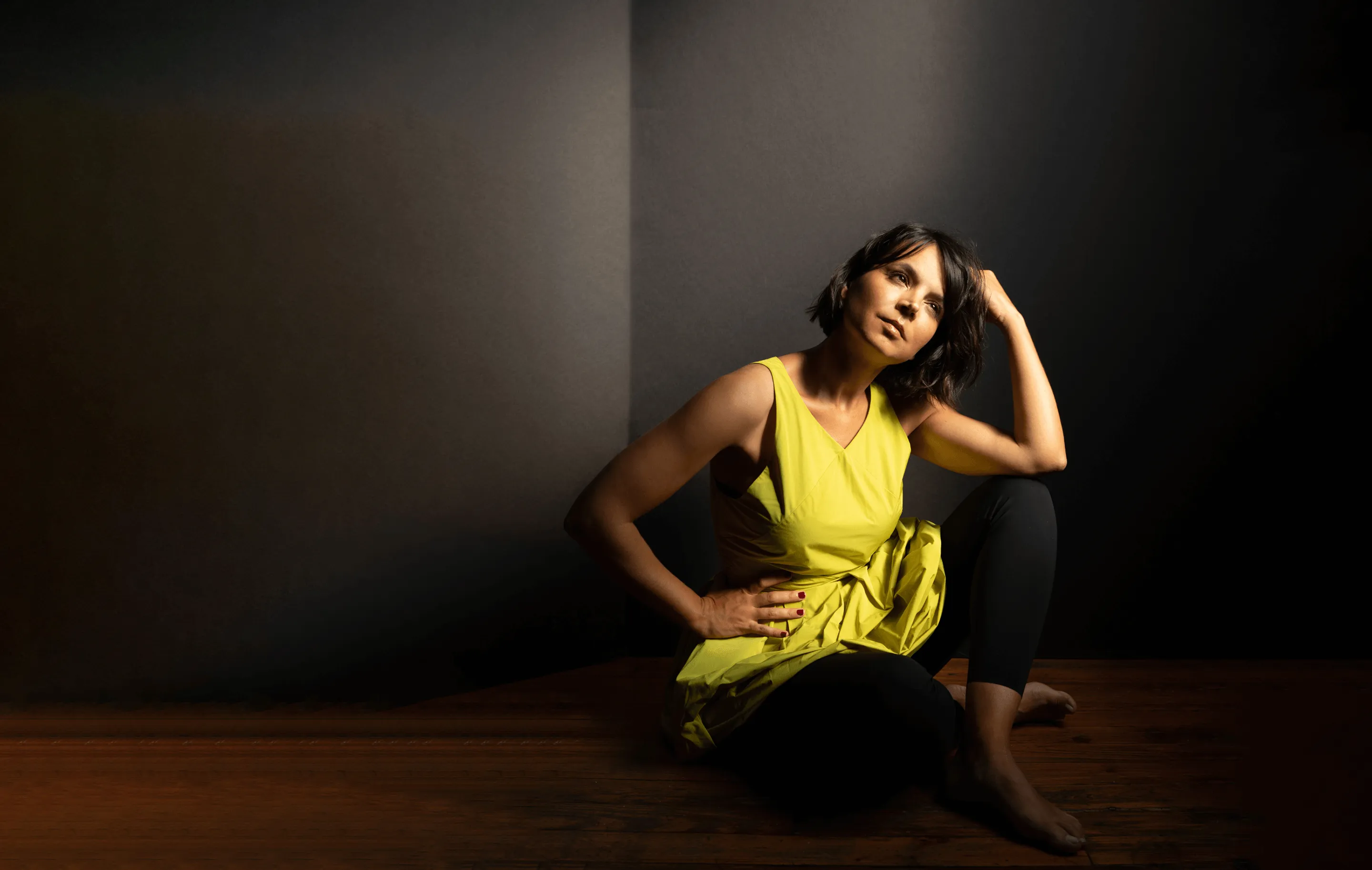Sara Serpa, natural de Lisboa e radicada em Nova Iorque, é vocalista, compositora, improvisadora, curadora, editora de revista e ativista cultural. Descrita pelo The New York Times como “uma cantora de postura luminosa e espírito cosmopolita” e pela JazzTimes como “uma mestre das paisagens sem palavras”, Serpa explora a voz como instrumento e as interseções entre som, emoção e narrativa. O seu trabalho abrange música composta e improvisada, projetos colaborativos e interdisciplinares, bem como iniciativas editoriais, formando uma constelação de práticas artísticas interconectadas.

ABOUT
EN
PT
Sara Serpa, from Lisbon, based in New York, is a vocalist, composer, improviser, curator, magazine editor, and an arts advocate. Described by The New York Times as “a singer of silvery poise and cosmopolitan outlook,” and by JazzTimes as “a master of wordless landscapes,” Serpa explores the voice as an instrument and the intersections of sound, emotion, and narrative. Her work spans composed and improvised music, collaborative and interdisciplinary projects, and editorial initiatives, forming a constellation of interconnected artistic practices.
Sara Serpa has performed at some of the New York City’s most iconic venues, including Lincoln Center, the Metropolitan Museum of Art, Joe’s Pub, and the Village Vanguard. Since 2008, she has toured internationally with her own projects, bringing her genre-defying music to festivals and stages across Europe, Australia, North and South America. Serpa has been touring extensively with renowned bassist Linda May Han Oh, contributing her voice to some of today’s most visionary and boundary-pushing musical collaborations.
Born and raised in Lisbon, Portugal, Serpa grew up immersed in books, art, and music. Her work is often shaped by themes of migration, history, and identity, and she draws inspiration from poetry, film, and global political narratives.
Over the years, she has worked with an impressive range of artists, including Ran Blake, Mark Turner, Ingrid Laubrock, Zeena Parkins, Sofía Rei, Angelica Sanchez, Aubrey Johnson, Matt Mitchell, Kris Davis, David Virelles, John Zorn, Erik Friedlander, Danilo Perez, Greg Osby, Qasim Naqvi, Okkyung Lee, and André Matos, her long-time duo partner, among many others.
Serpa’s voice has also inspired and contributed to the work of renowned contemporary composers, including Andreia Pinto Correia, Aya Nishina, Ashley Fure, Derek Bermel, Joseph C. Phillips Jr., and Ingrid Laubrock.
Beyond the stage, Serpa is also the co-founder of M³ (Mutual Mentorship for Musicians), a groundbreaking collective dedicated to supporting women and gender-expansive artists through mentorship, collaboration, and community-building. With M³, she’s helped create a living archive of music, writing, and conversations that center underrepresented voices in the music world.
A passionate educator, Serpa teaches at The New School along with workshops and clinics around the world. Whether in performance, collaboration, or community-building, she continues to redefine what it means to be a vocalist and composer in the XXI century.
+ PRESSKIT DOWNLOAD


"A singer of silvery poise and cosmopolitan outlook" .
The New York Times

East Coast Tour with Matt Mitchell!
EN
PT
Matt Mitchell and I will be on the road to promote our new album, End of Something. It is always so special to get to perform the same music several nights in a row and I am looking forward to making music with Matt. If you are in DC, Philly, New Haven, Northampton or New York, please spread the word and join us!
Wed, Dec 3, 7pm, Georgetown Day School, Washington DC, Tickets here
Thur, Dec 4, 8pm, Solar Myth, Philadelphia, Tickets here
Fri, Dec 5, 8:30pm/10pm, Firehouse 12, New Haven, Tickets here
Sat, Dec 6, 7:30pm, Institute for the Musical Arts, Goshen, MA, Tickets here
Mon, Dec 8, 7:30pm/ 9pm, Close Up, NYC, Tickets here
This tour was supported in part by Jazz Road, a national program of South Arts funded by the Doris Duke Foundation with additional support from the Mellon Foundation.
Matt Mitchell e eu estaremos em digressão para apresentar o nosso novo álbum, End of Something. É sempre uma oportunidade especial interpretar o mesmo repertório várias noites consecutivas.
Quarta-feira, 3 de dezembro, 19h — Georgetown Day School, Washington DC,
Quinta-feira, 4 de dezembro, 20h — Solar Myth, Filadélfia,
Sexta-feira, 5 de dezembro, 20h30/22h — Firehouse 12, New Haven,
Sábado, 6 de dezembro, 19h30 — Institute for the Musical Arts, Goshen, MA,
Segunda-feira, 8 de dezembro, 19h30/21h — Close Up, Nova Iorque,
Esta digressão conta com o apoio do programa nacional Jazz Road, da South Arts, financiado pela Doris Duke Foundation, com apoio adicional da Mellon Foundation.
NEWS
MEDIA


“Serpa possesses a preternatural cool, injecting weightless sophistication and melodic grace into everything she touches.”
Peter Margasak, The Chicago Reader
SHOWS
October 17, 2025 | 14:00
Sara Serpa & André Matos 4tet
Bar Bayeux
Sara Serpa- voice
André Matos- guitar
Dov Manski- piano
Ivanna Cuesta- drums
+ MORE
November 5, 2025 | 13:30
w/ Linda May Han Oh
Teatro Metropolitan, Catania, Italy
The Glass Hours 4tet:
Linda May Han Oh-bass
Sara Serpa - Voice
Fabian Almazan - piano/effects
Mark Whitfield Jnr
November 6, 2025 | 13:18
w/ Linda May Han Oh
Palermo, Italy
Linda May Han Oh- The Glass Hours 4tet
Sara Serpa - Voice
Fabian Almazan - piano/effects
Mark Whitfield Jnr- drums
November 7, 2025 | 13:18
w/ Linda May Han Oh
Duc des Lombards, Paris
Linda May Han Oh- The Glass Hours 4tet
Sara Serpa - Voice
Fabian Almazan - piano/effects
Mark Whitfield Jnr- drums
November 8, 2025 | 13:18
w/ Linda May Han Oh
Duc des Lombards, Paris, France
Linda May Han Oh- The Glass Hours 4tet
Sara Serpa - Voice
Fabian Almazan - piano/effects
Mark Whitfield Jnr- drums
November 9, 2025 | 13:18
w/ Linda May Han Oh
The Unterfarht, Munich, Germany
Linda May Han Oh- The Glass Hours 4tet
Sara Serpa - Voice
Fabian Almazan - piano/effects
Mark Whitfield Jnr- drums
November 11, 2025 | 01:30
w/ Linda May Han Oh
Elb Philarmonie, Hamburg, Germany
Linda May Han Oh 5tet- The Glass Hours
Sara Serpa - Voice
Will Vinson- Alto Saxophone
Fabian Almazan - piano/effects
Mark Whitfield Jnr
November 13, 2025 | 01:30
w/ Linda May Han Oh
Zig Zag Club, Berlin, Germany
Linda May Han Oh 5tet- The Glass Hours
Sara Serpa - Voice
Will Vinson- Alto Saxophone
Fabian Almazan - piano/effects
Mark Whitfield Jnr
November 14, 2025 | 01:30
w/ Linda May Han Oh
Jassmine, Warsaw, Poland
Linda May Han Oh 5tet- The Glass Hours
Sara Serpa - Voice
Will Vinson- Alto Saxophone
Fabian Almazan - piano/effects
Mark Whitfield Jnr
November 15, 2025 | 01:30
w/ Linda May Han Oh
Duisburg, Germany
Linda May Han Oh 5tet- The Glass Hours
Sara Serpa - Voice
Will Vinson- Alto Saxophone
Fabian Almazan - piano/effects
Mark Whitfield Jnr
November 16, 2025 | 01:00
w/ Linda May Han Oh
Bechersaal, Bayreuth, Germany
Linda May Han Oh 5tet- The Glass Hours
Sara Serpa - Voice
Will Vinson- Alto Saxophone
Fabian Almazan - piano/effects
Mark Whitfield Jnr
December 3, 2025 | 13:00
Sara Serpa & Matt Mitchell
Georgetown Day School, Washington D.C
New album release, End of Something
Sara Serpa- voice
Matt Mitchell- piano
December 4, 2025 | 13:00
Sara Serpa & Matt Mitchell
The Solar Myth, Philadelphia
New album release, End of Something
Sara Serpa- voice
Matt Mitchell- piano
+ MORE
December 5, 2025 | 14:00
Sara Serpa & Matt Mitchell
The Firehouse 12, New Haven
New album release, End of Something
Sara Serpa- voice
Matt Mitchell- piano
+ MORE
December 6, 2025 | 14:00
Sara Serpa & Matt Mitchell
Institute For The Musical Arts, Goshen, MA
https://firehouse12.com/
+ MORE
December 8, 2025 | 13:30
Sara Serpa & Matt Mitchell
Close Up, New York, NY
Promoting new album, End of Something
Sara Serpa- voice
Matt Mitchell- piano
+ MORE
January 25, 2026 | 02:00
w/ Marta Sanchez
The Stone, NYC
Sara Serpa (voice, keyboards) Miriam Elhajli (voice) Marta Sanchez (piano)
+ MORE
January 29, 2026 | 02:00
Sara Serpa & Matt Mitchell perform "Purposing the Air"
Roulette, Brooklyn
Ingrid Laubrock‘s latest Pyroclastic Records release, Purposing the Air, is her first project to feature the voice. This expansive collection of miniatures for four duets sets to music the words of acclaimed poet Erica Hunt, drawn from her emotionally incisive piece “Mood Librarian – a poem in koan.” This performance will present a selection of these miniatures, featuring a world premiere of vocalist Sara Serpa with pianist Matt Mitchell, and vocalist Theo Bleckmann with guitarist Ben Monder.
+ MORE
March 20, 2026 | 00:30
w/ Linda May Han Oh
Oberlin College and Conservatory
Award-winning bassist and composer, Linda May Han Oh, leads this dynamic group of musicians performing The Glass Hours: a collection of works based on themes of the fragility of time and life. She will be joined by Greg Ward on alto saxophone, Sara Serpa on voice, Fabian Almazan on piano/effects, Mark Whitfield, Jr. on drums.
+ MORE
May 28, 2026 | 02:30
Sara Serpa @ The Stone
The Stone, NYC
Sara Serpa- voice, Matt Mitchell- piano




